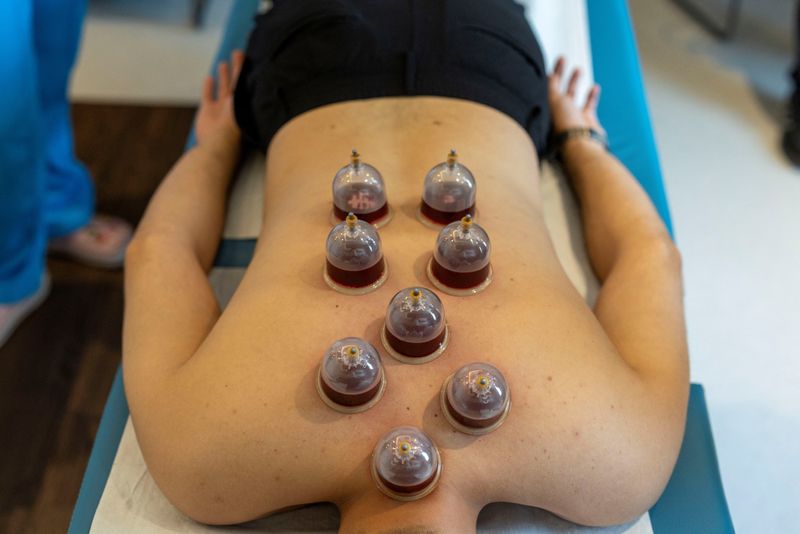Science
Turkish Hospitals Embrace Ancient Healing Methods in Modern Care

In Turkey, ancient healing practices such as cupping and leech therapy are gaining acceptance within modern healthcare. At the Medicana International Hospital in Istanbul, Dr. Erdal Dilekci performs wet cupping, a centuries-old therapy. This involves making small incisions on a patient’s back and applying suction cups to draw out toxins. The treatment aims to alleviate pain and improve overall wellness, as experienced by Furkan Ali Sayan, a 26-year-old nurse undergoing his first session.
Cupping, known locally as hacamat, is part of a broader trend where traditional therapies are integrated into hospital settings. This shift has been facilitated by legislative changes initiated in 2014, which allow certified medical practitioners across 66 of Turkey’s 81 provinces to offer such treatments. According to the Turkish Health Ministry, this official recognition aims to enhance safety and efficacy, moving these practices away from their historical roots in informal settings.
Dr. Dilekci, a specialist in physical medicine and rehabilitation, incorporates a variety of traditional methods into his practice, including ozone therapy, prolotherapy, acupuncture, and leech therapy. He notes that these treatments complement modern medicine rather than replace it, particularly for patients suffering from chronic conditions like fibromyalgia and migraines. Each treatment plan is personalized, considering factors such as the patient’s toxin load, medication history, and previous responses to treatments.
The timing of cupping therapy is also carefully considered, with Dr. Dilekci mentioning that treatments are often scheduled around lunar cycles. He explained, “We prefer the week after the full moon. Scientific studies have shown the moon’s gravitational pull can support its effectiveness.”
Safety is a significant concern for patients. Furkan Sayan expressed comfort in undergoing treatment at a hospital, especially after adhering to a strict three-day diet devoid of meat, dairy, or eggs prior to his session. This integration of ancient practices into regulated environments aims to prevent the risks of infection that often accompany unregulated treatments.
At the same hospital, Dr. Dilekci also uses leeches to assist a patient with circulation issues. Leech therapy is particularly effective for conditions such as varicose veins and joint pain. The leeches, sourced from sterile farms, release enzymes like hirudin, which acts as a natural anticoagulant, promoting better blood flow. Each leech is used only once to minimize infection risks.
The combination of traditional treatments and modern oversight is drawing patients not only from Turkey but also from regions such as Europe, the Middle East, and Central Asia. The World Health Organization (WHO) endorses the integration of traditional medicine into national health systems. It recognizes these practices as valuable contributors to health and wellbeing, emphasizing their potential to enhance health outcomes when applied safely and effectively.
As Turkey continues to embrace these ancient therapies, the evolution of healthcare is evident, blending the wisdom of traditional practices with the advancements of contemporary medicine.
-

 Lifestyle4 months ago
Lifestyle4 months agoLibraries Challenge Rising E-Book Costs Amid Growing Demand
-

 Sports3 months ago
Sports3 months agoTyreek Hill Responds to Tua Tagovailoa’s Comments on Team Dynamics
-

 Sports3 months ago
Sports3 months agoLiverpool Secures Agreement to Sign Young Striker Will Wright
-

 Lifestyle3 months ago
Lifestyle3 months agoSave Your Split Tomatoes: Expert Tips for Gardeners
-

 Lifestyle3 months ago
Lifestyle3 months agoPrincess Beatrice’s Daughter Athena Joins Siblings at London Parade
-

 World3 months ago
World3 months agoWinter Storms Lash New South Wales with Snow, Flood Risks
-

 Science4 months ago
Science4 months agoTrump Administration Moves to Repeal Key Climate Regulation
-

 Science3 months ago
Science3 months agoSan Francisco Hosts Unique Contest to Identify “Performative Males”
-

 Business4 months ago
Business4 months agoSoFi Technologies Shares Slip 2% Following Insider Stock Sale
-

 Science4 months ago
Science4 months agoNew Tool Reveals Link Between Horse Coat Condition and Parasites
-

 Sports4 months ago
Sports4 months agoElon Musk Sculpture Travels From Utah to Yosemite National Park
-

 Science4 months ago
Science4 months agoNew Study Confirms Humans Transported Stonehenge Bluestones









